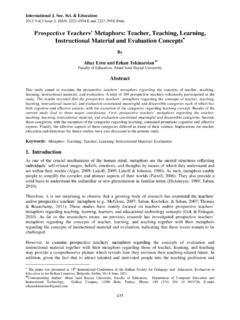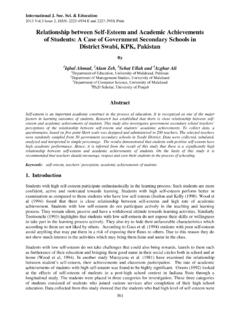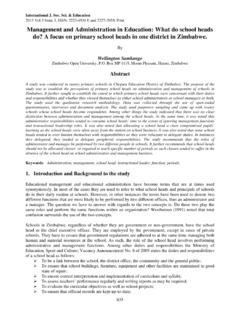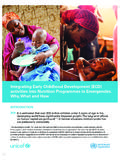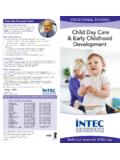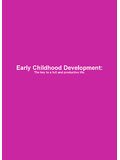Transcription of Quality of education Early Childhood Development …
1 International J. Soc. Sci. & education 2013 Issue 2, ISSN: 2223-4934 E and 2227-393X Print 351 Quality of education Early Childhood Development Class B learners in Zimbabwe: Case Study of Gweru Primary Schools By 1 Tendai Chikutuma and 2 Virginia Hope Mawere 1 Belvedere Technical Teachers College, Box BE 100, Belvedere, Harare, Zimbabwe 2 Zimbabwe Open University, 1119, Mt Pleasant Harare, Zimbabwe. Abstract This paper presents research conducted on the Quality of administration, teaching and learning of Early Childhood Development B learners (5-6 year olds) popularly known as Grade Zero in Zimbabwe.
2 The work was conducted in the Gweru primary schools. Using the descriptive survey administration, teaching and learning of the five to six year olds in Gweru primary schools was examined. The data was collected using interviews and observations coupled with observation. Results were blended with related literature to examine the viability of the inclusion of Early Childhood Development B learners in primary schools. Qualitative and quantitative analysis of data were applied to a sample of five schools.
3 Results from the study indicated that the Early Childhood Development B inclusion in primary schools was not quite viable as it failed to cater for the all-round Development of learners. For instance age appropriate equipment were not available and appropriate activities were not being administered and thus the environment itself was not conducive to the age group s needs of learning through play. Keywords: Early Childhood Development , class B learners, grade zero, learning through play.
4 1. Introduction Globally there has been much attention given to the millennium Development goals which include the provision of education and care among all other age groups including the zero to eight year olds. Although politicians, educators and parents have opinions about Early Childhood Development education and Care unfortunately there is very little research done of current activities. The lack of literature and research linked to the implementation and inclusion of Early Childhood Development (ECD) B in the primary schools makes it difficult for all concerned to come up with informed decisions that go beyond subjective information.
5 However, in spite of its inclusion in primary schools, there is little uniformity and in its teaching and learning policies. Historically, prior to the Jomtien Conference of 1990,as reported by Matsuura (2000) most countries knew about Early Childhood Development but were not committed to try and change the services they were offering. However, the Jomtien Conference, 1990, marked a historical moment for the entire zero to six year olds. It saw several countries including Zimbabwe signing the protocol on the provision of education for all including the zero to six year olds.
6 Quoting the Jomtien Conference 1990 deliberations, Evans (2002) suggests that the investment in the ECD stage gives social and economic benefits to the country. As a follow up to the signed protocol, the Dakar Conference of 2000 was convened to evaluate participant countries response to the Jomtien Conference of 1990 s deliberations on Early Childhood Development , education and Care. Matsuura, (2000) giving a report on the Dakar Conference of 2000, in which Zimbabwe participated, says there is need to expand and improve ECEC for the zero to six year olds, the vulnerable and the disabled.
7 One of the agreements endorsed by participant countries was that all signatories to those conferences must make education accessible for all the zero to six year olds. Tendai Chikutuma and Virginia Hope Mawere 352 As a follow up to these discussed conferences, in Africa the period around 1990 marked significant changes in ECEC just as it did globally. On November 20 1980, Convention of Rights for Children was formerly adopted by the United Nations General Assembly and the signing of the rights commenced in January 1990 and among the rights was the right to education .
8 Bridgemohan (2001) writing about South Africa on Early Childhood Development says that ECEC started in 1994. The research states that prior to 1994, ECD programmes were purely racial as financial support for black children s education and care was minimal while for the white children, it was quite substantial. According to Bridgemohan (2001) 1995 saw the birth of the reception class (Grade R) to redress the transitional problems faced by disadvantaged learners as they entered primary school.
9 This reception class was made up of five to six year olds. The administration of the reception class was under two ministries, that is the Ministry of education and that of Social Welfare (UNESCO, 2005). By the time of the research, the reception class was being housed in the public primary schools, communities and private institutions. It must be noted however that funding from the South African Government was limited in urban centres but substantial in rural areas. Regarding Zimbabwe, the Nziramasanga Commission (1999) asserts that ECD programmes date back to the pre-colonial era, and was mostly catering for white children.
10 The Ministry of Community Development and Women s Affairs according to the UNESCO report (2005) launched ECEC in 1981. The programme catered for zero to six year olds and was community based. This implied that the community looked for the teachers, sourced for materials, equipment and infrastructure without the Government s support. The Nziramasanga Commission (1999) also states that the main objectives were to promote holistic Development of all children by offering a stimulating environment to enable them to explore and reach their potential for schooling and lifelong learning.





